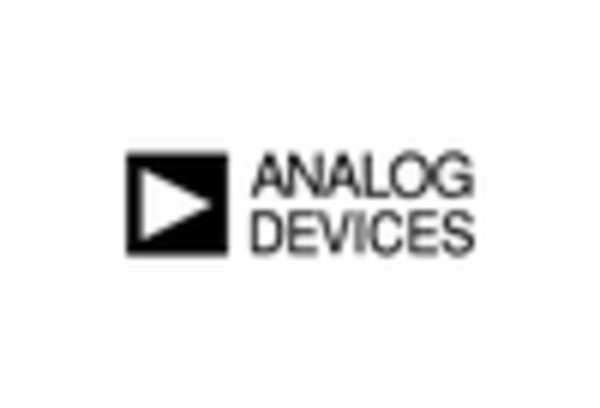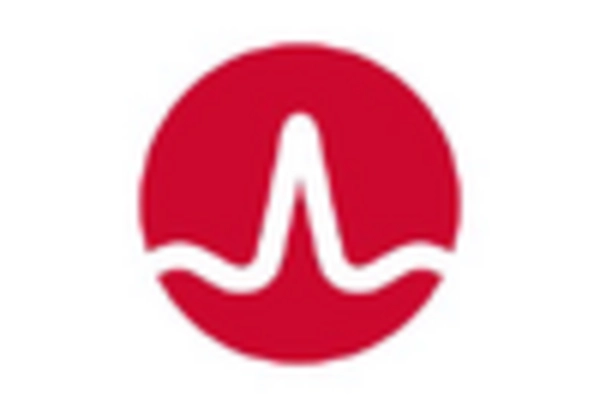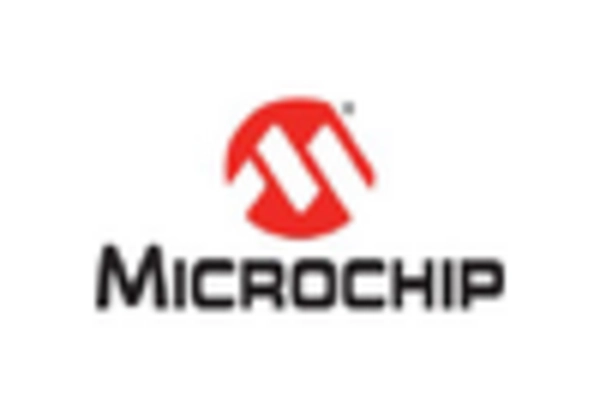Growth of Smart City Initiatives
The growth of smart city initiatives in South Korea is emerging as a pivotal driver for the ethernet phy-chip market. As urban areas increasingly adopt smart technologies, the need for reliable and efficient networking solutions becomes paramount. The South Korean government has allocated approximately $2 billion for smart city projects, which encompass various applications such as traffic management, public safety, and energy efficiency. These initiatives require advanced ethernet phy-chips to facilitate real-time data communication and processing. Consequently, the ethernet phy-chip market is likely to benefit from this trend, as manufacturers strive to develop chips that meet the specific requirements of smart city applications, thereby enhancing overall urban infrastructure.
Surge in Data Center Investments
The ethernet phy-chip market in South Korea is experiencing a notable surge in data center investments. As organizations increasingly migrate to cloud-based solutions, the demand for high-performance networking components, including ethernet phy-chips, is escalating. In 2025, the data center market in South Korea is projected to reach approximately $5 billion, reflecting a growth rate of around 15% annually. This trend necessitates advanced ethernet phy-chips that can support higher data rates and improved reliability. Consequently, manufacturers are focusing on developing chips that can handle the increasing bandwidth requirements, thereby driving innovation within the ethernet phy-chip market. The expansion of data centers is likely to continue, further propelling the demand for these essential components.
Rising Adoption of Industrial Automation
The rising adoption of industrial automation in South Korea is significantly impacting the ethernet phy-chip market. As industries seek to enhance operational efficiency and reduce costs, the integration of automated systems is becoming increasingly prevalent. The South Korean manufacturing sector, valued at approximately $200 billion, is expected to invest heavily in automation technologies, which will drive the demand for ethernet phy-chips. These chips are crucial for enabling seamless communication between various automated devices and systems. As industries continue to embrace automation, The ethernet phy-chip market is likely to witness substantial growth. Manufacturers are focusing on developing chips that can withstand harsh industrial environments while providing reliable performance.
Increased Focus on Cybersecurity Solutions
The increased focus on cybersecurity solutions in South Korea is emerging as a significant driver for the ethernet phy-chip market. With the rise in cyber threats, organizations are prioritizing the implementation of secure networking solutions. The South Korean government has initiated various cybersecurity programs, allocating over $1 billion to enhance national security measures. This emphasis on security is likely to influence the design and functionality of ethernet phy-chips, as manufacturers are compelled to integrate advanced security features into their products. As the demand for secure networking solutions grows, the ethernet phy-chip market is expected to expand, with a focus on developing chips that not only provide high-speed connectivity but also robust security measures.
Advancements in Telecommunications Infrastructure
The ongoing advancements in telecommunications infrastructure in South Korea are significantly influencing the ethernet phy-chip market. With the rollout of 5G technology, there is a pressing need for robust networking solutions that can support the increased data traffic. The South Korean government has invested heavily in enhancing its telecommunications framework, with expenditures expected to exceed $3 billion by 2026. This investment is likely to create a favorable environment for the adoption of advanced ethernet phy-chips, which are essential for ensuring seamless connectivity and high-speed data transmission. As telecommunications companies upgrade their networks, the demand for innovative ethernet phy-chip solutions is anticipated to rise, thereby fostering growth in the market.














